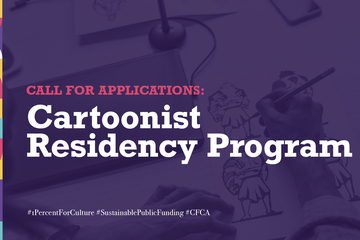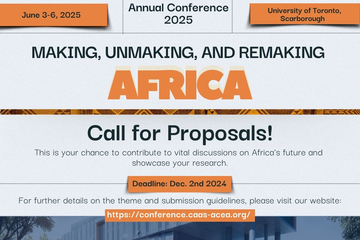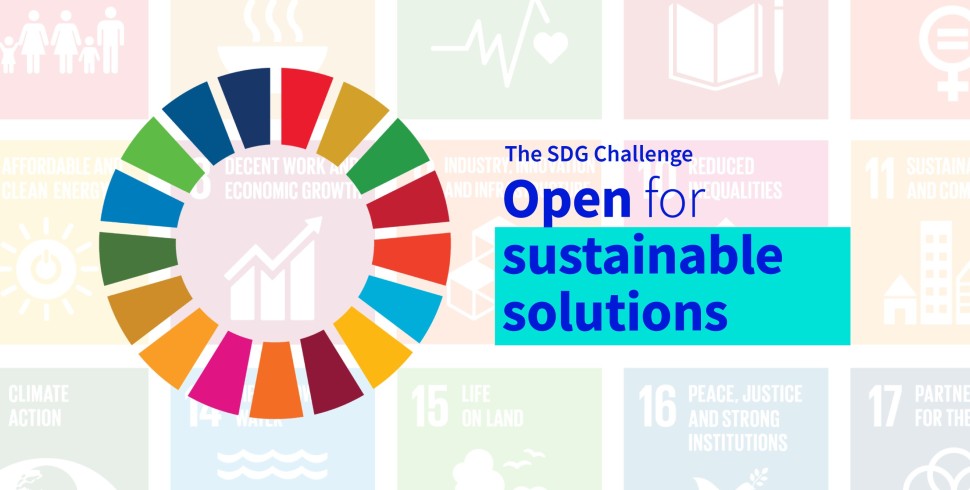Browse
Culture And Society
Grants to celebrate the contribution of African Food to American Cuisine (Uganda)
The U.S. Embassy in Uganda is inviting applications for its culinary diplomacy program, “Celebrating the Contribution of African Food to American Cuisine,” in honor of Black History Month 2025.
💰 Grant Size: $10,000 - $100,000📍 Eligible Country: Uganda
This program seeks innovative projects that celebrate the rich influence of African cuisine on American food culture. Grants will be awarded to projects in:
🌱 Agriculture, Food & Nutrition
🎨 Arts & Culture
🍽 Hotels, Restaurants, and Hospitality
📈 Economic Development
🛠 Career Development
💡 Innovation
For more information, visit https://grants.gov/search-results-detail/356842
Premium Link: https://grants.fundsforngospremium.com/opportunity/op/celebrating-the-contribution-of-african-food-to-american-cuisine-uganda
By:
Baboki Gaolaolwe-Major
Wednesday, Oct 30, 2024
CULTURE AND SOCIETY
+2
No Preview Available
Leave a comment
Call for Applications: Cartoonist Residency Program
Are you a talented young cartoonist passionate about cultural advocacy and artistic collaboration? Apply now for the Cartoonist Residency Program — an empowering opportunity to support young African cartoonists through virtual and in-person learning, creative exchange, and cultural advocacy.Click here for more information and to apply: https://cfcafrica.org/call-for-applications-cartoonist-residency-program/
By:
Baboki Gaolaolwe-Major
Tuesday, Oct 29, 2024
CULTURE AND SOCIETY
+1

Leave a comment
Making, Unmaking, and Remaking Africa!
This is your chance to contribute to vital discussions on Africa's future and showcase your research.Read more and apply here: https://conference.caas-acea.org/
By:
Baboki Gaolaolwe-Major
Wednesday, Oct 23, 2024
CULTURE AND SOCIETY
+1

Leave a comment
IRELAND: SFI Sustainable Development Challenge (Over €1,000,000 Grant) 2025
Grant size: 1 million Euros
Donor: The Science Foundation Ireland
The SDG Challenge seeks to support diverse, transdisciplinary teams to develop transformative, sustainable solutions that will contribute to addressing development challenges under the UN SDGs in countries where Irish Aid works.
SFI and Irish Aid are seeking solutions that contribute to SDG 2: Zero Hunger, “End hunger, achieve food security and improved nutrition and promote sustainable agriculture”.
The SDG Challenge supports highly motivated, transdisciplinary teams developing transformative, sustainable solutions for UN SDGs in Irish Aid’s partner countries. Furthermore, interested applicants should take note of the following criteria:
Teams must be transdisciplinary and focused on developing sustainable solutions for UN SDGs in Irish Aid’s partner countries.
Teams should combine technical and non-technical skills and represent collaborative partnerships between researchers in Ireland and the partner country.
Expertise in a STEM research area is necessary ,along with knowledge or experience in complementary fields like international development, economics, or behavioral science.
Two academic researchers must be in the core team, with at least one from a relevant STEM discipline.
Funding should reflect the contributions of all team members.
https://www.afterschoolafrica.com/87048/science-foundation-ireland-sfi-2024-sustainable-development-challenge-over-e1000000-grant/
By:
Tony Milanzi
Tuesday, Aug 27, 2024
AGRI-FOOD SYSTEMS
+5

No Preview Available
Leave a comment
AREF Research Development Fellowship Programme (Africa)
Deadline: 4th October 2024
Grant size: Fellowship
Donor: AREF Research Development
The Africa Research Excellence Fund is pleased to launch the call for the 2024/25 AREF Research Development Fellowship Programme.
Programme Overview
Aim. To support researchers in Africa who are emerging leaders and working on important challenges for human health, to develop their skills as a researcher.
What we offer. A three to nine-month placement at a leading research institution in the UK, Europe or Africa, with additional support at your home institution before and after the placement. Up to £47,000 available
Who is eligible? Early career researchers. These are research active post-doctoral scientists and clinicians with higher qualifications who are nationals of and employed in Africa (see detailed eligibility criteria).
How to apply. Read the guidance documents carefully before developing your proposal and starting your application. Complete the application form via the portal at https://programmes.aref-africa.org.uk/
https://africaresearchexcellencefund.org.uk/funding-calls/open-funding-research-development-fellowship-2024-25/
By:
Tony Milanzi
Tuesday, Aug 27, 2024
CULTURE AND SOCIETY
+4
No Preview Available
Leave a comment
Hallo everyone, This is Josh Maiyo joining from USIU-Africa in Nairobi, Kenya. I am interested in the intersection between the political ecology of development, natural resource governance and social justice. Looking forward to fruitful collaborations.
By:
Josh Maiyo
Tuesday, Aug 20, 2024
AGRI-FOOD SYSTEMS
+2
Leave a comment
Hello everyone, I am joining the Directorate of Youth Friendly Resource Centre, University of Nigeria. I am interested in countering Youth poverty, especially in Africa
By:
Professor Christian Ezeibe
Saturday, Aug 17, 2024
CULTURE AND SOCIETY
+1
Leave a comment
Good morning, everyone. I am joining this group from the University of Nigeria. And I am happy to be here. best
By:
Nnamdi Ajaebili
Friday, Aug 16, 2024
CULTURE AND SOCIETY
Leave a comment
Applications open for Local Partner Fund - Congo DR
Grant size: $500,000 - $1 million
Donor: USAID
The United States Agency for International Development (USAID) is currently accepting applications for the Local Partner Fund (LPF).
Purpose
The USAID/DRC Local Partner Fund (LPF) will strive to ensure that, in all activities, local partner and/or local communities lead development and humanitarian efforts, including problem identification, priority setting, design, partnership formation, implementation, and measuring results as defined by the Agency locally-led program indicator. The LPF will make a significant contribution to the USAID direct funding to local organizations objectives while enhancing the application of best practices for locally led development.
USAID LPF will advance USAID DRC localization agenda by addressing competition requirements and allowing an open solicitation process to receive concepts for partnering with local organizations and increasing their ability to generate and achieve locally led solutions to major development challenges, and by providing direct awards to local organizations to implement activities. USAID LPF will work in tandem with USAID Localization Capacity Strengthening Mechanism to respond to capacity building needs in partner organizations and help to strengthen the abilities of local partners beyond the donor-awardee relationship in a way that guarantees consistency, mutual accountability, and sustainability. USAID LPF will consider inclusive development as a key element of USAID local programming across the DRC and CAR, and will foster collaboration, learning, and adapting, as prerequisites for successful implementation.
https://grants.gov/search-results-detail/355506
By:
Tony Milanzi
Friday, Aug 16, 2024
CULTURE AND SOCIETY
No Preview Available
Leave a comment
Notice of Funding Opportunity: Tanzania Digital Collaboration
Grant Size: $100,000 to $500,000
Donor: US Mission to Tanzania
The U.S. Embassy Dar es Salaam/Bureau of African Affairs of the U.S. Department of State announces an open competition for organizations to submit applications to carry out a program to create targeted exchange programs and a conference aimed at relevant Tanzanian policymakers, civil servants, and civil society to explore internet governance structures and strategies that promote a free and open internet governance policy in Tanzania to catalyze the expansion of the local digital economy and lead to economic growth.
This opportunity seeks to directly engage a Tanzanian civil society organization to identify a cohort of colleagues across a range of sectors, engage the cohort through multiple education and information sessions, and organize a major international conference on the theme of building resilient, open, and democratic digital systems. The conference should include U.S. experts who can advise on regulatory firewalls, policy creation and coordination, and balancing the protection of individual rights, general online safety and security with freedom of expression principles. The selected organization should have demonstrated familiarity with Tanzania’s civic space and policy processes.
https://grants.gov/search-results-detail/355559
By:
Tony Milanzi
Friday, Aug 16, 2024
CULTURE AND SOCIETY
No Preview Available
Leave a comment
ERG Research Grant Programme in LICs
Grant Size: $10,000 to $100,000
The Private Enterprise Development in Low-Income Countries (PEDL) is pleased to announce applications for the Research Grant Programme that aims to better understand what determines the strength of market forces driving efficiency in low-income countries (LICs).
Existing research suggests that the private sector in LICs faces a multitude of constraints that act upon each other. What is needed is research that allows them to understand how these constraints interact.
ERGs are grants of between £10,000 and £40,000. These grants will fund research assistance, data collection and new surveys in LICs, and (if necessary) teaching buyouts for the principal investigator. Please note that cost effectiveness and value for money are important evaluation criteria.
Eligibility Criteria
ERGs are designed to allow researchers to:
Explore new approaches to the study of firms in LICs; and
To develop new (or build on) existing sources of data on firms in LICs.
https://pedl.cepr.org/content/38th-regular-erg-call-open-deadline-19th-august-2024
By:
Tony Milanzi
Friday, Aug 16, 2024
CULTURE AND SOCIETY
No Preview Available
Leave a comment
CFAs: FRIAS Early Career Fellowships Programme
Grant Size: Fellowship
The Freiburg Institute for Advanced Studies (FRIAS) is inviting applications for its Early Career Fellowships Programme to support academic exchange across existing boundaries between disciplines, between different cultures and countries, between established and younger researchers.
https://www.frias.uni-freiburg.de/en/news/call-for-applications/frias-early-career-fellowship-programme
By:
Tony Milanzi
Friday, Aug 16, 2024
CULTURE AND SOCIETY
+1
No Preview Available

Leave a comment